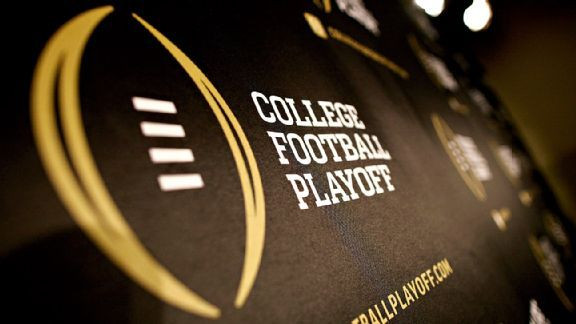College Football Playoff System Begins: More Bowl Games, New Sponsorships And No BCS

The 2014 college football season has arrived, and with it the inaugural College Football Playoff, the NCAA’s first attempt at crowning an undisputed national champion after decades of split titles. In part due to new sponsors and a selection process to determine the top teams, the postseason may prove unrecognizable to fans compared to its previous incarnation, the Bowl Championship Series.
Four of the nation’s top teams will advance to the postseason, with two moving on to the National Championship to be held at Cowboys Stadium in Arlington, Texas on Jan. 12, 2015.
In the process, the NCAA has also condensed the schedule of the most high-profile bowl games over the course of 36 hours between New Year’s Eve and New Year’s Day, all to be aired on Disney’s ESPN. The total number of bowl games will also increase from 39 to 35 this season.
The NCAA has taken a beating these last few seasons, specifically from critics who argue it exploits players to reap major profits and sanctions them with draconian measures when they try to cash in on their names and likenesses.
Now the NCAA is trying to bank some goodwill with fans by playing out the national title game, rather than allowing complicated algorithms programmed into the BCS computer to decide which team is the best in the country.
There is really only one step to the postseason system. The top four teams will be chosen by a 13-person selection committee at the conclusion of the regular season. Then the teams will decide everything on the field. The Rose Bowl and Sugar Bowl will start the six-bowl semifinal rotation this season, followed by the Orange and Cotton bowl in 2016 and the Fiesta and Chick-fil-A Bowl in 2017. Previously the Fiesta, Orange, Rose and Sugar Bowls would rotate host duties for the national championship as well, but that has shifted completely.
Now cities will give presentations and bid to host the national title game, much like the NFL’s Super Bowl. Arlington just beat out Tampa, Florida for this season, but will host in 2017 right after Glendale, Arizona.
Every CFP game will be broadcast by ESPN, thanks to the 12-year, $7.3 billion deal it struck in 2012. Annually the network will pay $600 million to televise the games and the selection announcement, similar to the NCAA’s March Madness.
ESPN’s massive investment shows the titan of a network thoroughly believes the CFP will be a resounding success, but they are still trying to recoup some of their fixed costs from sponsors. Though exact figures of the CFP presenter sponsor deals haven’t been released, it’s believed ESPN was asking for $5 million to $10 million more from sponsors. In turn three of the four biggest bowl games now have new sponsors. Sports Business Journal reported in June that both Discover and Tostitos ended their respective sponsorships of the Orange and Fiesta Bowls, and in April Northwestern Mutual Life Insurance took over Rose Bowl duties from Vizio. That leaves insurance giant Allstate and its ties to the Sugar Bowl as the only holdover from the BCS era.
SBJ also reported that Capital One was in the final stages of a deal to take over as the Orange Bowl’s sponsor, further solidifying its relationship with ESPN in tandem with its self-titled Bowl Week and bowl game sponsorships.
Though the National Championship won’t have a corporate sponsor, Dr. Pepper was the first to secure the title of Championship Partner and will present the CFP trophy, continuing its relationship with the coveted hardware since 2010. Again no figures of the deal have been released other than the six-year length, but some modest estimates have Dr. Pepper shelling out $35 million a season.
© Copyright IBTimes 2024. All rights reserved.





















